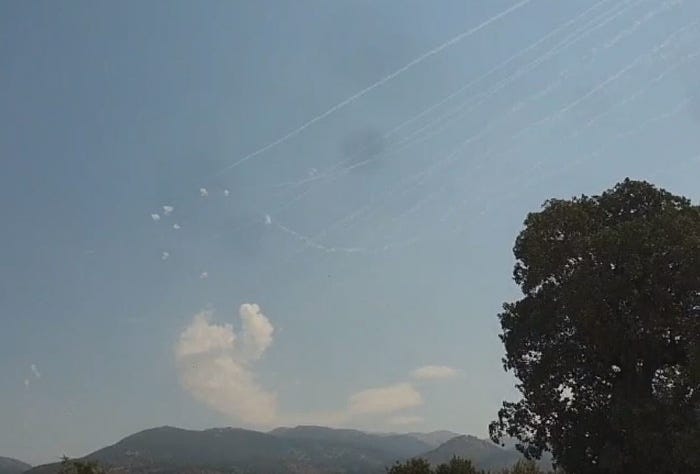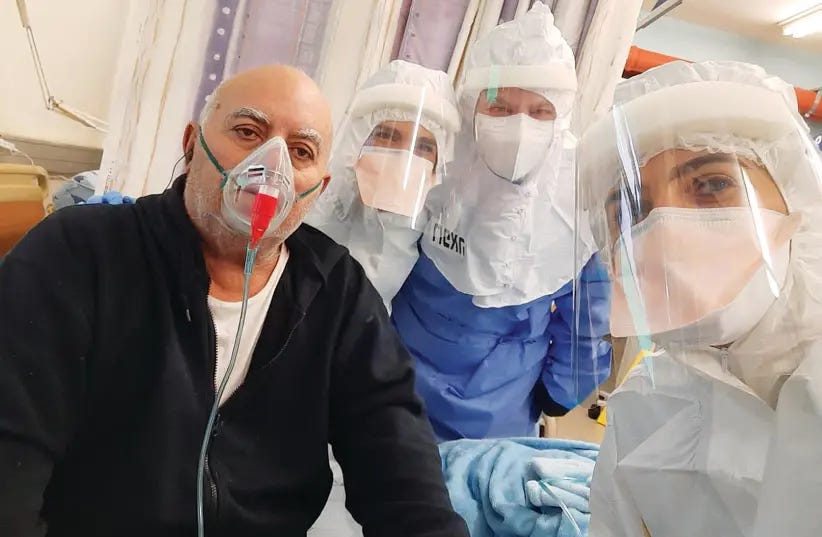DEFENSE
As I was finishing last week’s newsletter, a notification appeared of an attack on an Israeli-owned ship off the coast of Oman — more on that in a minute. This week, 19 rockets were fired at the Northern Part of the Golan Heights. Iron Dome intercepted ten, three fell in Lebanon, and six fell in Israeli open fields. Hezbollah officially took responsibility for the attack, the first time it attacked Israel since the 2006 war. Hezbollah claimed the rocket barrage was a response to Israel’s attack on Lebanon last night, which was in reaction to the rockets fired on Kiryat Shmona on Wednesday. In its announcement, Hezbollah stated it had fired specifically on the largely uninhabited Har Dov region since it did not seek to trigger a larger war. The IDF initially indicated that Israel also did not want a wider war, however, it would not countenance a worsening of the situation on its northern border.
The latest attack follows a series of events that appear to be leading to a confrontation in the North. Last Friday, an Israeli-owned ship was attacked by an Iranian RPV, and the assault killed two; the Romanian Captain and the British Security Officer. This aggression, regarding which the Iranians claimed innocence at various points, and eventually attempted to justify, marked a new escalation in the quiet warfare that has been taking place between Israel and Iran. The Iranian action both simultaneously united the western countries in condemnation of Iran and served the Iranian purpose of warning the West that the vital shipping lanes in the Gulf are vulnerable.
Iran’s action has worked in Israel’s favor diplomatically, allowing it to underscore the dangers posed by Iran. On Wednesday, I was interviewed by Turkish TV about the attack and the subsequent events — including Foreign Minister Yair Lapid’s meeting with Ambassadors of countries with members on the Security Council. The Interviewer, who I have known for a few years, was convinced that Israel has been planning to attack and is working on garnering support from the US and Britain. He was sure that military intervention was Israel’s only leverage to stop and new Nuclear agreement with Iran. I am skeptical.
On another front, Israel was surprised Wednesday, when three rockets were fired at Kiryat Shmona from Lebanon. Supposedly, they were fired by a Palestinian faction without the knowledge of Hezbollah. With Lebanon disintegrating in front of the world’s eyes, anything is possible. However, the attack highlighted the threat that exists from Lebanon, and provided a very, very small preview of what we might expect out of Lebanon, from Iran’s proxy — Hezbollah. Israel responded by mounting the first air attack on targets in Lebanon since 2014. However, the targets chosen were more likely meant to send a message than to cause serious damage.
Where we go from here is a big unknown. Israel could decide not to respond, and thereby, end this round. The question that remains is the relationship between the events on the Northern border to the more significant confrontation with Iran. Israeli intelligence officers are reportedly divided on that issue.
GREECE
Israel is sending firefighters to help Greece fight its very treacherous fires. Defense Minister Gantz spoke with his Greek counterpart this week and offered to provide whatever assistance we can.
COVID—19
The number of new infections continues to rise. However, of much greater concern, is the number of seriously ill patients, which has doubled in the past ten days, and stands at 253. At the same time, the number of new cases reached 3,843 yesterday, with 3.79% of the tests coming back positive. Hospitals are starting to reach their capacity, and due to several factors, were already full before the Corona wave hit this summer.
Nevertheless, the government has been reluctant to take meaningful steps that might slow the transmission of the disease. It did reimpose the “green pass” system, requiring people to show proof of vaccination, or evidence of a negative test before entering any indoor venue. Yet, they put off the full implementation for two weeks. They also inexplicably exempted synagogues from the regulation.
However, the government did put in effect mandatory quarantine for all those returning from almost every country in the world for one week, even those who are vaccinated. This decision seems largely an attempt to respond to the year-long criticism that the airport is the source of our problems since we now have a higher rate of Covid than most of the places from which we require quarantine. To me, it seems more dangerous to go to an indoor concert or movie in Israel, all of which are open, than to come back to Israel from abroad — especially since in order to board a plane to Israel you must be Covid Negative, and you get tested in the airport. I believe that forcing people to remain home until they get a negative PCR test would be the more intelligent thing to do, since to date, enforcing any quarantine regime has not been one of Israel's success stories.
The new government, like its predecessor, is putting “all of its eggs in the vaccine basket”. The hope is that by giving a third dose to the older cohorts in the population, we can limit the number of seriously ill patients. Of those seriously sick in the country, 80% are over 60, and 75% are fully vaccinated. With 90% of those over 60 in the country vaccinated, that should not be a surprise. However, of those under 60, almost all who are seriously ill have not been vaccinated.
Based on a recent study by Israel's Maccabi correcting for age and health status, those who received the vaccine in January are 2.2 times more likely to get COVID than those who received their shot in April. Based on those results, it’s clear the vaccine is less effective in protecting from infection over time. The hope is that the number of older people who get infected will drop for those who get the booster (like I received last week). However, the concern is that with everything in the economy still open, and most people not taking proper precautions (which is abundantly evident walking around tel Aviv on Thursday night), the infection numbers will be so large that even with better protection, the numbers will continue to rise.
On a more positive note, Phase 2 trials have been completed on a drug developed at Tel Aviv’s Icholov Hospital that treats patients with severe Covid-19. The Phase 2 trials took place in Greece, as at the time, there were not enough Coronavirus patients here in Israel. In the trials, 29 out of 30 patients recovered within days and were discharged. The drug is called EXOCD-24. The drug targets the mechanism that creates a cytokine storm in a patient’s lungs; the cytokine storm is the body’s reaction to the virus, the manifestation of which makes people deathly ill. The delivery method of this drug, i.e., using Exosomes (a type of extracellular vesicle), allows highly targeted delivery of the medication.
Icholov is about to enter into a Phase 3 trial, where 155 patients will be examined. 2/3 will receive the drug, and the other 1/3 a placebo. The hospital hopes to complete the trial by the end of 2021, which seems to be a version of Project Warp Speed, as it pushes ahead to speed up the process. Pray this works as well as initially seen by the trials — lives are at stake!
POLITICS AND BUDGET
For the first time in three years, the Israeli cabinet has approved a budget. The big winners are the Ministry of Defense, as usual, and this time, the Ministry of Health. Health Minister Horowitz played political hardball, saying he could not support a budget that did not provide additional support to Israel’s hard-pressed health sector. While no one believed he would bring down the government over this issue, no one except some bean counters in the Finance Ministry could argue that the needs are not real.
In the end, all of the other ministries accepted a 1.5% cut to provide an additional NIS 2 billion for the Health Ministry. Almost all significant reforms, along with the taxing of artificially sweetened beverages and reusable plates and containers, were included. In addition, the new budget calls for the opening up of agriculture, and virtually every other area to imports, and a reform of the system of Kashrut supervision. While the budget still has to be approved by the Knesset, unless something changes drastically, the expectation is that this budget will pass; thereby ensuring the government will remain in power for the next two years.
Meanwhile, we’re seeing the first signs that the power of former Prime Minister Netanyahu has started to wane. First, in a secret vote, 2/3 of Likud Knesset members voted for someone other than Netanyahu as the Likud candidate for the Judicial appointment committee. Then, when voted on by the whole Knesset, the Likud candidate did not win the opposition seat. The appointment went to Religious Zionist Party MK Simcha Rotman.
While Netanyahu’s loss of power is not bad for the health of Israel's democracy, the unintended consequences are not always positive. Rotman, who I debated at least a half a dozen times over the past few years on ILTV, is very far to the right, and believes in drastically limiting judicial power.
ECONOMY
An exciting company doing some good things … Today, AgroScout announced it has completed a Series-A investment round of $7.5 million to expedite its AI cloud platform development for remote agronomy and increased its accessibility to the 500 million primarily unserved farms worldwide. The platform allows all growers, from the biggest to the smallest, to efficiently comply with the rising demand for sustainable crop protection and carbon accountability.
Swedish gaming company “Embrace” has purchased the Israeli gaming company “CrazyLabs”. The terms of the purchase were not disclosed. However, the company which develops mobile casual games claims to have had 4.5 billion downloads in 2020, with 110 million active users.








